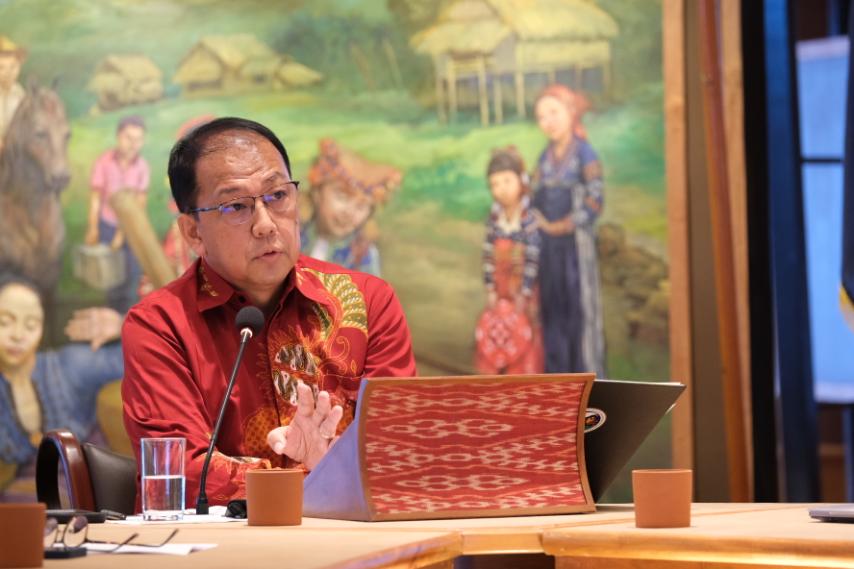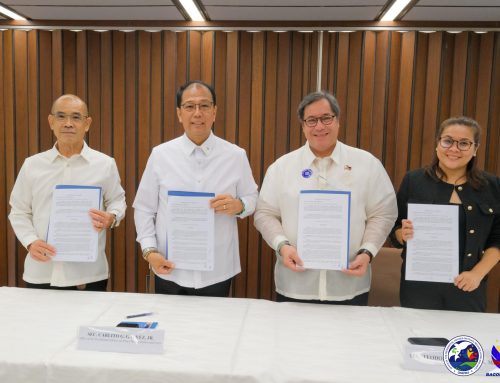PASIG CITY (27 October 2022) – The Office of the Presidential Adviser on Peace, Reconciliation and Unity (OPAPRU) is pleased with the improvement of the Philippines’ ranking in the 2022 Rule of Law Index of the World Justice Project (WJP).
According to Presidential Peace Adviser Sec. Carlito G. Galvez, Jr. the Philippines had, in fact, gone against the tide, as 61% or 85 out of the 140 countries that were surveyed by WJP reported a decline in their observance of the rule of law.
“The rise in the Philippines’ ranking from 102nd out of 139 countries last year, to 97th out of 140 nations this year is a testament that advancing the rule of law has become a top priority of the government, as the country’s peace, order and security continue to improve,” Galvez said.
He attributed this positive development to the strengthened and sustained implementation of the comprehensive Philippine peace process, particularly by facilitating the holistic transformation of former combatants, their families and communities.
Under the Marcos Administration’s peace, reconciliation and unity agenda, Galvez said the OPAPRU actively engages key sectors of society such as local governments, civil society, the academe and security sector, among others, as partners in peace and development.
“In order for us to sustain this momentum and further improve our rankings in the WJP Index, we need to involve everyone in the peacebuilding process. Our interventions must be as inclusive and participatory as possible. No one should be left behind,” he stressed.
With the OPAPRU’s expanded mandate by virtue of Executive Order No. 158, the peace adviser said the agency is committed to enhancing the country’s resiliency for peace by creating an environment where a just and long-lasting peace can take root and flourish.
And the best way to do this, Galvez explained, is for the national government to adopt peace education as a core strategy, an initiative that is expected to make a significant impact not only in the academe, but also create a multiplier effect that will be felt across all sectors.
“This is the reason why the OPAPRU is working closely with the Department of Education (DepEd) and the Commission on Higher Education (CHED). So that we can institutionalize peace education in the country’s basic and higher level curriculum and in other learning institutions,” he said.
“We believe that peace education is the most effective way of cultivating a culture of peace. Through our partnership with the DepEd and CHED, we want to train our youth to be peace-loving and peace-promoting members of society,” Galvez added.
Once trained in the culture of peace, he said the youth can help defuse, if not prevent, situations of violence and conflict, and thereby ensure that academic institutions remain free from all forms of violence and discrimination.
“Bullying, hazing, radicalization, and violent extremism have no place in our education system. We must therefore create the conditions that will empower our youth to become agents of peace, mutual understanding and solidarity,” Galvez emphasized.
And as the culture of peace becomes embedded in the country’s education system, he said that the respect for the rule of law, justice and equality will become the norm not only in schools and campuses, but across communities.
During the observance of the National Peace Consciousness Month last September, Galvez, together with a OPAPRU delegation, joined Supreme Court justices led by Chief Justice Alexander Gesmundo in visits to Cagayan de Oro City and Marawi.
SC Chief Justice Gesmundo led the unveiling of historical markers at the Mindanao State University-Main Campus, which was among the testing sites nationwide of the 2020/21 Bar Examinations, the first digitalized and regionalized Bar Exams held in the country.
“These events highlighted the shared objective of the OPAPRU and the Judiciary to strengthen the nexus between the rule of law with our peacebuilding and development initiatives, in partnership with our local partners and stakeholders,” he said.
Also in September, the OPAPRU, in collaboration with DepED and CHED, with support from Mindanao State university and Ateneo de Davao University, held the First National Peace Education Summit.
The two-day event brought together leading peace practitioners and champions to share their experiences and discuss the most recent innovations, trends, and concerns, as well as challenges encountered and solutions adopted in the field of peace education.
The summit, which was attended by a total of 446 participants (120 physical and 326 online), reviewed and provided inputs on the proposed executive order strengthening the institutionalization of peace education in basic and higher level education and other learning institutions.
“We at OPAPRU are optimistic that our partnerships with the academe and the Philippine judiciary will bring us closer to our shared goal of fostering the culture of peace, while strengthening the rule of law in our country,” Galvez said.###












